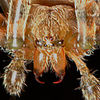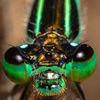Which macro lens to buy?
Jul 20, 2014 13:53:32 #
I currently shoot mostly kids sports, landscapes and some event photography. I have a Canon 50D and 6D. I want to get into macro with my landscape work and am wonder the pros and cons or best suggestions between the Canon 100L or 185L. Input from anyone with either of these two lenses will be appreciated. Thanks in advance.
Jul 20, 2014 14:15:51 #
I'm not much into macro but what I've seen on these two lens is that the preferred on is the 185 because you don't have to get as close to the subject and scare it off. Maybe if you the 'search' it would give you a little more:D
Jul 20, 2014 14:20:42 #
I'm sold on the Canon EF 100mm f/2.8L IS USM. The image quality is superb and on an aps-c camera like the 50D, you're talking about a 160mm equivalent, but using the sweet-spot of the lens. My sister, who is a macro photographer, borrowed my lens for a couple of months last summer, and she has done nothing but talk about how this will be her very next lens purchase.
Jul 20, 2014 14:27:16 #
Jerry Brown wrote:
Thanks for the inputI'm not much into macro but what I've seen on these two lens is that the preferred on is the 185 because you don't have to get as close to the subject and scare it off. Maybe if you the 'search' it would give you a little more:D
Jul 20, 2014 14:27:55 #
Bob Yankle wrote:
Thanks for the inputI'm sold on the Canon EF 100mm f/2.8L IS USM. The image quality is superb and on an aps-c camera like the 50D, you're talking about a 160mm equivalent, but using the sweet-spot of the lens. My sister, who is a macro photographer, borrowed my lens for a couple of months last summer, and she has done nothing but talk about how this will be her very next lens purchase.
Jul 20, 2014 16:54:54 #
Jul 20, 2014 17:22:56 #
napabob wrote:
Thanks for the inputstart with the 100L it's a great lens
Jul 21, 2014 00:07:26 #
I have a statement, and a question:
I recommend that you accept macro lens recommendations only from photographers willing to post examples of their macro-photography.
Are you locked into Canon lenses only, or would you consider a Sigma, Tamron, or Tokina lens of comparable quality?
Third-Party Macro Lenses Compared
http://www.uglyhedgehog.com/t-213504-1.html
I recommend that you accept macro lens recommendations only from photographers willing to post examples of their macro-photography.
Are you locked into Canon lenses only, or would you consider a Sigma, Tamron, or Tokina lens of comparable quality?
Third-Party Macro Lenses Compared
http://www.uglyhedgehog.com/t-213504-1.html
Jul 21, 2014 01:00:25 #
Canon makes a 180L. Tough lens to start out macro with. Not only will you have to get used to the weight but diffuse flash illumination presents challenges at that working distance, ~12 inches. I certainly wouldn't buy one new as Canon is rumored to be releasing a 200mm, 2:1 macro this year so 180 value will take a hit. Used it for $1000 or less and it's a good buy.
For someone starting out in Macro I think 100mm is a good starter lens. Nice working distance, managable weight, and easily adapted to flash/diffuser illumination. Canon 100 is good value used. Full retail price is a stretch when compared to the Sigma 105mm. It is optically equal to the Canon offering. One thing in Canon's favor is the weather sealing but it comes at a cost - $350 more.
For someone starting out in Macro I think 100mm is a good starter lens. Nice working distance, managable weight, and easily adapted to flash/diffuser illumination. Canon 100 is good value used. Full retail price is a stretch when compared to the Sigma 105mm. It is optically equal to the Canon offering. One thing in Canon's favor is the weather sealing but it comes at a cost - $350 more.
Jul 21, 2014 09:59:10 #
I'll chime in here as well.... I am another in the 90-1-5mm lens camp... I have macro lenses from 55 to 180mm, both AF & MF versions... Granted I shoot Nikon, but that is irrelevant when it comes to what focal length to shoot. That focal length range selection is the most convenient when shooting insects in the field.Longer lenses will allow you to have more distance between you & your subject, but that comes at a cost ( in both $$$ & size/weight of the lenses). Illumination is key in getting quality images. Thus a softbox or ringlight is needed. Tripods are great for static subjects, but can't be easily set up & used when your subject is mobile. As for what brand of macro lens to get. I have found that technique tops gear selection when it comes to shooting macro.... Sure, DxOmark may rate one lens higher than another but in practical field use, those differences quickly disappear...
Jul 21, 2014 11:40:59 #
Nikonian72 wrote:
Thanks for the input. I will check it out.Third-Party Macro Lenses Compared
http://www.uglyhedgehog.com/t-213504-1.html
http://www.uglyhedgehog.com/t-213504-1.html
Jul 21, 2014 11:42:12 #
A-PeeR wrote:
Thanks for the input.Canon makes a 180L. Tough lens to start out macro ... (show quote)
Jul 21, 2014 11:43:24 #
Screamin Scott wrote:
Thanks for the input.I'll chime in here as well.... I am another in the... (show quote)
Jul 21, 2014 13:29:00 #
From my limited experience, I'd look into a lens about 100mm and some automatic extension tubes. You'll also need a way to illuminate the subject. I started with a crop sensor 40mm macro auto focus lens and shot wide open (2.8) most of the time. I then got a manual focus 100mm lens, extension tubes, basic flash unit and a diffuser. With a bunch of practice, I'm starting to like the results. The next change I'll make is a flash bracket that get the unit closer to the end of the lens. That will hopefully allow me to cut the flash power from 100% to 25%. With that change I'll get much faster recycle times so I'll have multiple images to do a focus stack. I know it's a long winded answer, but you'll need more than just the lens to have a fun time shooting macro.
Jul 21, 2014 14:42:43 #
Curve_in wrote:
Thanks for the input.From my limited experience, I'd look into a lens a... (show quote)
If you want to reply, then register here. Registration is free and your account is created instantly, so you can post right away.






